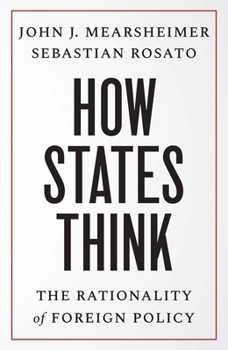How States Think: The Rationality of Foreign Policy
Select Format
Select Condition 
Book Overview
A groundbreaking examination of a central question in international relations: Do states act rationally? To understand world politics, you need to understand how states think. Are states rational? Much of international relations theory assumes that they are. But many scholars believe that political leaders rarely act rationally. The issue is crucial for both the study and practice of international politics, for only if states are rational can scholars and policymakers understand and predict their behavior. John J. Mearsheimer and Sebastian Rosato argue that rational decisions in international politics rest on credible theories about how the world works and emerge from deliberative decision-making processes. Using these criteria, they conclude that most states are rational most of the time, even if they are not always successful. Mearsheimer and Rosato make the case for their position, examining whether past and present world leaders, including George W. Bush and Vladimir Putin, have acted rationally in the context of momentous historical events, including both world wars, the Cold War, and the post-Cold War era. By examining this fundamental concept in a novel and comprehensive manner, Mearsheimer and Rosato show how leaders think, and how to make policy for dealing with other states.
Format:Paperback
Language:English
ISBN:0300279876
ISBN13:9780300279870
Release Date:September 2024
Publisher:Yale University Press
Length:304 Pages
Weight:0.80 lbs.
Dimensions:0.8" x 5.1" x 7.8"
Customer Reviews
1 rating
Limited Contribution to Learning How States Think
Published by JCLV , 4 months ago
Book suffers from fundamental methodological flaws that undermine its central argument. By defining rationality so broadly and flexibility any decision can be deemed rational through post-hoc reasoning. The authors' render their theory unfalsifiable and therefore unscientific. The book's treatment of historical cases demonstrates a consistent pattern of cherry picking evidence to support predetermined conclusions rather than rigorously testing whether decisions meet clear criteria.
Rather than defending the rationality assumption the book actually undermines it to justify any desired conclusion.
There is justifiable skepticism about the book's contribution to understanding how states think. A more honest approach would acknowledge the limitations of rational based explanations while working to develop more nuanced and testable theories of state behavior.






